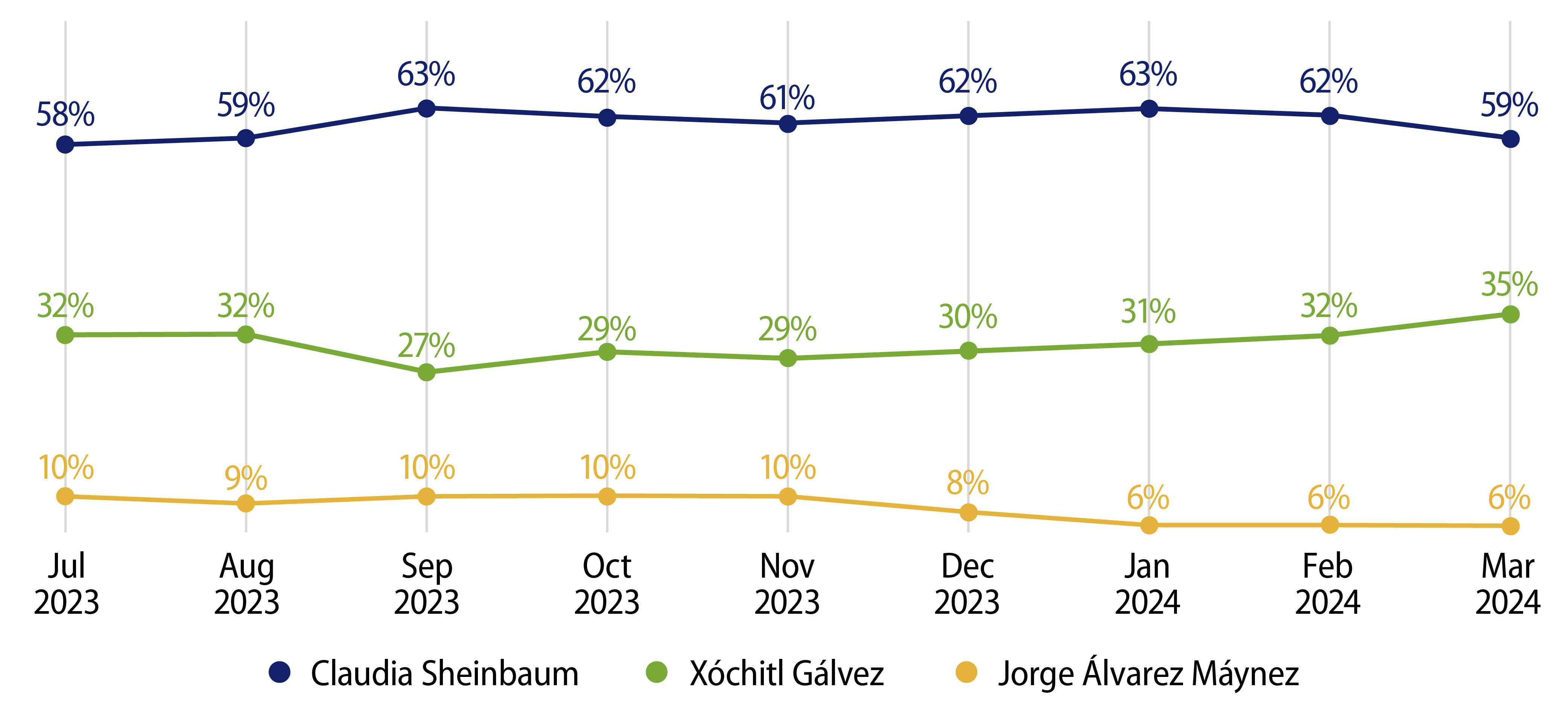The upcoming elections this year in emerging markets (EM) hold significant importance for global growth, trade stability and international relations. In this post, we'll spotlight two key EM elections: Mexico and India. These countries are attracting considerable investor interest, and the results of their presidential and legislative elections can greatly affect broader EM market sentiment.
Mexico: June 2, 2024
Election Type: Presidential and Congressional
What’s the backstory?
Andrés Manuel López Obrador (AMLO) and his Morena Party swept into power in 2018, promising to combat corruption and implement sweeping reforms to transform Mexico’s economy. Their victory marked a win for the Left and an end to decades-long rule from the political establishment. AMLO’s populist stance initially rattled investors both domestically and internationally, leading to increased volatility in Mexican financial and currency markets. Despite his ambitions, AMLO struggled to garner sufficient political support to enact key legislation, such as fully repealing a 2013 law that opened Mexico’s energy markets to foreign investment. Additionally, his pet infrastructure projects, including a new military airfield, a Gulf Coast refinery and the Maya train line, failed to boost economic growth.1 Recently, the International Monetary Fund (IMF) revised down its economic growth forecast for Mexico in 2024 to 2.4% from 2.7%, citing weaker-than-expected outcomes. The IMF also reduced its 2025 growth projection for Mexico to 1.4% from 1.5% in January.2 Despite lost opportunities as a result of AMLO’s policies, remittances and robust portfolio flows led to strong currency appreciation. While Mexico's fiscal situation has deteriorated at the margin, we assess that a ratings downgrade below investment-grade is not an immediate concern. Furthermore, ongoing disinflation and trends favoring nearshoring suggest positive prospects for the Mexican economy over the long term.
What do we expect in these elections?
With a solid 59% approval rating, we anticipate that Claudia Sheinbaum, the Morena Party candidate, is well positioned to clinch victory in the June 2024 presidential election. We’re closely monitoring the outcomes in both houses of Congress, where a two-thirds majority by Morena would grant Sheinbaum the authority to pursue constitutional changes, particularly in cementing state control over the power sector.3
We view the upcoming presidential transition as a positive development for both foreign and domestic investors. First, a Sheinbaum presidency is an opportunity for a reset with the business community, particularly as we view her to be more pragmatic and less contentious compared to AMLO. Second, we anticipate her administration will prioritize strengthening trade relations with the US and enhancing Mexico’s potential for nearshoring. It’s worth noting that Sheinbaum lacks the same level of popularity and legitimacy as does AMLO. Consequently, we do anticipate some initial governance challenges in the early months of her tenure, especially considering Mexico’s near-term financial constraints. 4

How are we playing the Mexico story?
We’re constructive on Mexican local rates due to nominal and real yields being at or near historical highs. With Banxico currently in an easing cycle, we’re adopting a slightly more tactical approach regarding the Mexican peso at its current levels. This decision is influenced by the peso’s sustained appreciation since mid-2022, upcoming Mexican and US presidential elections and changing expectations regarding US monetary policy easing.
India: April 19-June 1, 2024
Election Type: Parliamentary
What’s the backstory?
Narendra Modi assumed office as India’s Prime Minister in 2014, following a historic victory by the Bharatiya Janata Party (BJP)-led National Democratic Alliance (NDA). Modi’s platform centered on anti-corruption and Hindu nationalism, drawing support from many Indians. His successful tenure as chief minister of Gujarat state, India’s fifth-largest state with over 60 million people, bolstered his reputation for economic prowess amid India’s slowing growth. Despite challenges during his first term, including economic downturns, a controversial tax evasion program and rising youth unemployment, Modi led the BJP to another overwhelming victory in 2019.5 Since then, India has experienced significant economic growth, rebounding strongly after the pandemic to become one of Asia’s fastest-growing economies and a global power, serving as a counterweight to China. In April 2024, the IMF revised India’s growth forecasts upward. The growth forecast for 2023-2024 was raised to 7.8% from the previous 6.7%, and for 2024-2025 to 6.8% from 6.5%.6 India currently maintains a solid investment-grade rating, supported by a surplus in balance of payments, moderate inflation, and strong foreign direct investment (FDI) and portfolio flows, contributing to a strong external position. Moreover, India ranks among the top five globally in foreign exchange reserves, boasting an impressive $643 billion.7
What do we expect in these elections?
We anticipate Modi securing a third term as Prime Minister once the votes of nearly 970 million people are tallied and the results are announced on June 4. Modi currently holds the highest approval rating among global leaders, backed by significant campaign resources and a robust on-the-ground voter recruitment effort. As of early April, the BJP appears positioned to win the majority of the 543 seats in the Lok Sabha (Lower House). However, it’s expected to be a challenging contest, with polls indicating voter dissatisfaction due to increasing unemployment and rising inflation. It’s worth noting that Modi and the BJP are aiming for a supermajority (two-thirds of the seats) in this election. Such a victory would enable Modi to enact major constitutional changes, including the implementation of the “One Nation, One Election” agenda, which proposes holding national and state elections simultaneously to streamline the electoral process and focus on economic development.8 India’s opposition party has voiced concerns about Modi’s growing power, highlighting a perceived erosion of free elections, an independent judiciary, media freedom and the peaceful transition of power during his 10-year tenure. Moreover, they’ve cautioned against Modi’s potential use of supermajority power to promote Hindu nationalism, which could potentially undermine India’s secular foundation.9

How are we playing the India story?
India currently offers the highest bond yields among the nine largest Asian economies excluding Japan, making it a standout choice from a relative value perspective. Notably, foreign holdings in the Indian bond market represent less than 1% of the total outstanding bonds, indicating a lesser susceptibility to global market fluctuations. Given this scenario and the attractive carry relative to peers, coupled with strong technical tailwinds due to inclusion in JP Morgan’s GBI-EM Index, we expect India’s local bonds to outperform this year.10 Consequently, we maintain a long position in a mix of Indian government bonds, INR-denominated supranational bonds, and the INR.
ENDNOTES
1.“Mexico's Lopez Obrador Pledges Legal Rollback of Energy Overhaul”, Bloomberg, March 15, 2017 and “Mexico Tries to Turn Back the Clock on Energy”, Foreign Policy, October 4, 2019
2. International Monetary Fund, World Economic Outlook, April 2024
3. “Mexico’s Leading Presidential Hopeful Would Tighten State Grip on Power Sector”, Bloomberg, January 5, 2023
4. “Challenges to Sheinbaum’s Fiscal Policy”, Wilson Center, February 16, 2024
5. “Why India wiped out 86% of its cash overnight”, BBC, November 14, 2016
6. International Monetary Fund, World Economic Outlook, April 2024
7. Reserve Bank of India, April 12, 2024
8. “What is ‘one nation, one election’ and what are its pros and cons”, Times of India, September 1, 2023 and “Indians vote in the first phase of the world’s largest election as Modi seeks a third term” Associated Press, April 19, 2024
9.“Here’s what you need to know about the world’s largest democratic election kicking off in India”, Associated Press, April 18, 2024
10.Indian bonds will eventually hold a weight of 10% in the index, following 1% additions to its weightage each month starting in June 2024.



